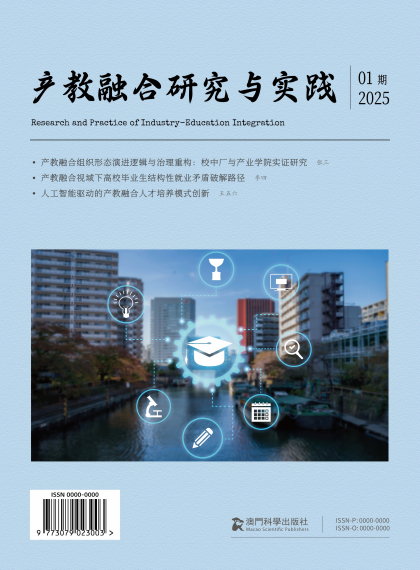摘 要:
职业本科教育肩负着培养高层次应用型人才的重要使命,然而在实际运行中,其人才培养规格与“产业高端”岗位的匹配度问题逐渐成为制约职业本科教育发展的关键议题。本文以智能网联汽车领域为例,分析职业本科人才培养规格与产业高端岗位需求对接的现状及问题,采用文献研究、问卷调查与案例分析相结合的方法,对该领域“产业高端”岗位需求进行详尽梳理,同时对职业本科教育的培养目标、课程体系、能力要求进行深入研究。结果显示,当前职业本科人才培养规格在岗位技术能力、综合素质与创新能力等方面与产业高端岗位需求尚存在一定差距,主要表现为对智能网联汽车领域新兴技术的掌握不足、跨学科知识融合能力薄弱以及工程实践能力培养未能全面落实。针对上述问题,本文进一步提出优化人才培养规格的策略,包括完善课程与岗位需求的动态调整机制、增强实践教学环节的设计与实施、以及强化产教融合的运行深度,以增强学生在智能网联汽车领域高端岗位的适应性与竞争力。研究成果对完善职业本科教育体系、推动高层次应用型人才的培养具有重要理论价值和实践意义,同时亦为智能网联汽车领域的人才供需对接提供了有益参考。
关键词:产业高端岗位; 智能网联汽车; 人才培养规格; 产教融合
Abstract:
Vocational undergraduate education bears the important mission of cultivating high-level application-oriented talents. However, in practice, the issue of the matching degree between talent training specifications and "high-end" industry positions has gradually become a critical topic hindering the development of vocational undergraduate education. This paper takes the field of intelligent connected vehicles as an example to analyze the current situation and problems regarding the alignment of vocational undergraduate talent training specifications with the demands of high-end industry positions. By employing a combination of literature research, questionnaire surveys, and case analysis, the high-end job demands in this field are thoroughly examined, and an in-depth study of the training goals, course system, and competency requirements of vocational undergraduate education is conducted. The results show that the current vocational undergraduate talent training specifications still have certain gaps in technical capabilities, comprehensive quality, and innovation abilities compared to the demands of high-end industry positions. These gaps are mainly manifested in inadequate mastery of emerging technologies in the intelligent connected vehicle field, weak interdisciplinary knowledge integration abilities, and insufficient implementation of engineering practice ability cultivation. In response to these issues, this paper further proposes strategies to optimize talent training specifications, including improving the dynamic adjustment mechanism of courses and job demands, enhancing the design and implementation of practical teaching segments, and strengthening the depth of integration between production and education, to enhance students' adaptability and competitiveness in high-end positions in the intelligent connected vehicle field. The research results have important theoretical value and practical significance for perfecting the vocational undergraduate education system and promoting the cultivation of high-level application-oriented talents, while also providing useful references for the talent supply-demand matching in the field of intelligent connected vehicles.
Keywords: High-end industry positions; Intelligent connected vehicles; Talent training specifications; Integration of industry and education
--
